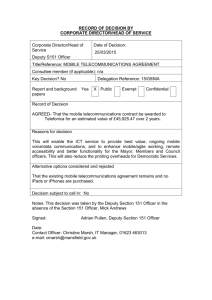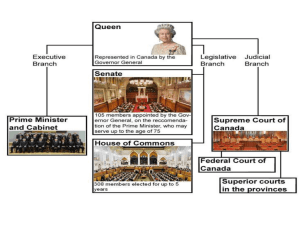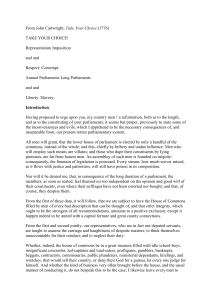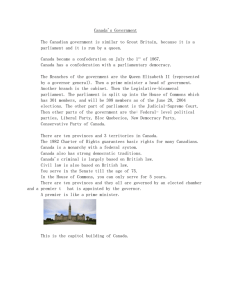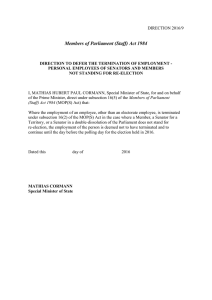PRESS RELEASE Transport, Telecommunications and Energy
advertisement
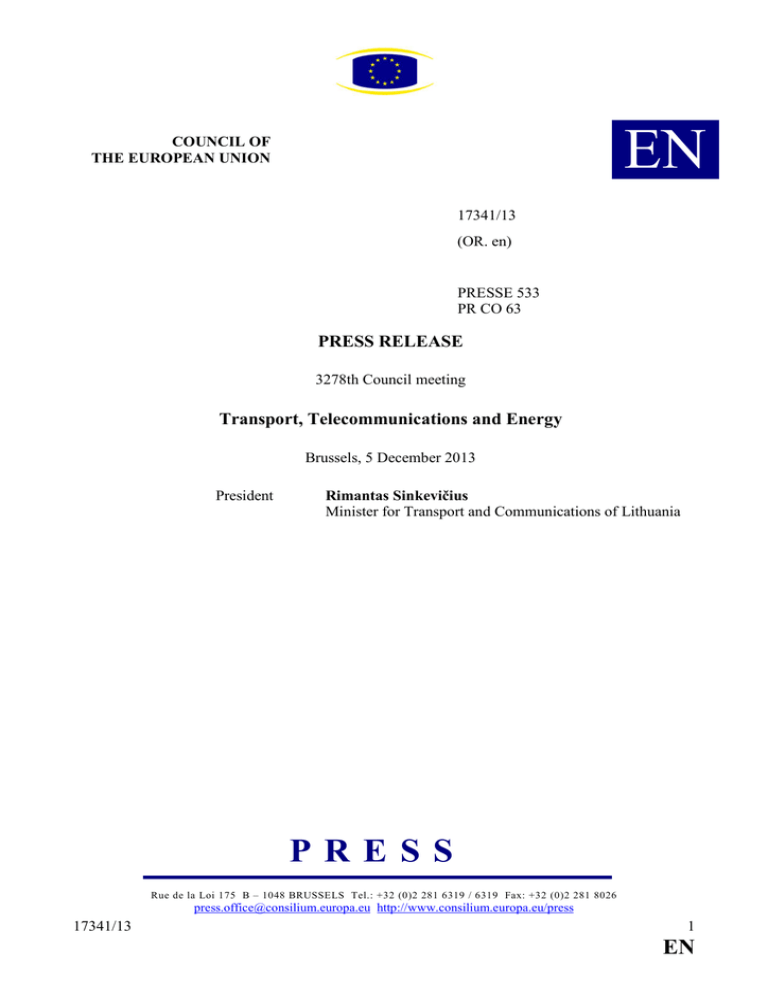
EN COU CIL OF THE EUROPEA U IO 17341/13 (OR. en) PRESSE 533 PR CO 63 PRESS RELEASE 3278th Council meeting Transport, Telecommunications and Energy Brussels, 5 December 2013 President Rimantas Sinkevičius Minister for Transport and Communications of Lithuania PRESS Rue de la Loi 175 B – 1048 BRUSSELS Tel.: +32 (0)2 281 6319 / 6319 Fax: +32 (0)2 281 8026 press.office@consilium.europa.eu http://www.consilium.europa.eu/press 17341/13 1 E 5 December 2013 Main results of the Council TELECOMMU ICATIO S Telecommunications single market The Council held a policy debate on a proposal aimed at amending the EU telecommunications regulatory framework. The draft regulation is part of the Connected Continent package. Cyber security The Council took note of the state of play regarding a draft directive aimed at ensuring a high common level of network security across the EU. Broadband network cost reduction Ministers took note of progress on proposed measures to facilitate investment in high-speed broadband networks by reducing the costs involved. TRA SPORT Alternative fuels infrastructure Ministers agreed a general approach on a proposal aimed at building up a minimum infrastructure for alternative fuels across the EU. The draft directive is part of the Clean Power for Transport initiative. European Railway Agency The Council took note of progress on a draft regulation aimed at giving new tasks to the European Railway Agency and streamlining its existing processes. The proposal is part of the fourth railway package. Air passenger rights The Council took stock of progress on a proposed update of the EU rules on air passenger rights. Air transport agreement with Brazil Lastly, ministers mandated the Commission to reopen negotiations with Brazil on a comprehensive air transport agreement. 17341/13 2 E 5 December 2013 Important items adopted without discussion (A items) include: – regulation on the Connecting Europe Facility (CEF), the future funding instrument for the trans-European networks (TEN) in the fields of transport, energy and telecommunications – new guidelines for the development of a complete trans-European transport network (TEN-T) – new financial and governance framework for the European satellite navigation systems (EGNOS and Galileo) for 2014-2020 – regulation listing the third countries whose nationals must be in possession of visas when crossing the external borders – programme in support of the competitiveness of EU enterprises for 2014-2020 – directive laying down basic safety standards for protection against the dangers arising from exposure to ionising radiation – regulation establishing a Programme for the Environment and Climate Action (LIFE Programme) for 2014-2020 – regulation establishing the Creative Europe Programme for 2014- 2020. 17341/13 3 E 5 December 2013 CO TE TS1 PARTICIPA TS................................................................................................................................ 7 ITEMS DEBATED TELECOMMUNICATIONS............................................................................................................... 9 Cyber security ...................................................................................................................................... 9 Cutting the cost of broadband rollout ................................................................................................ 10 Telecommunications single market ................................................................................................... 11 Other business .................................................................................................................................... 12 Trans-European telecommunications networks ................................................................................. 12 Electronic identification..................................................................................................................... 12 Work programme of the incoming presidency in the field of telecommunications........................... 12 TRANSPORT .................................................................................................................................... 13 European Railway Agency................................................................................................................. 13 Alternative fuels infrastructure .......................................................................................................... 14 Air passenger rights ........................................................................................................................... 14 Negotiations with Brazil on a comprehensive air transport agreement ............................................. 15 1 Ÿ Where declarations, conclusions or resolutions have been formally adopted by the Council, this is indicated in the heading for the item concerned and the text is placed between quotation marks. Ÿ Documents for which references are given in the text are available on the Council's Internet site (http://www.consilium.europa.eu). Ÿ Acts adopted with statements for the Council minutes which may be released to the public are indicated by an asterisk; these statements are available on the Council's Internet site or may be obtained from the Press Office. 17341/13 4 E 5 December 2013 Other business .................................................................................................................................... 16 Aviation emissions trading................................................................................................................. 16 Passenger ship safety ......................................................................................................................... 16 Impact of state aid rules on large-scale infrastructure projects.......................................................... 16 Galileo and EGNOS........................................................................................................................... 17 Blue Belt ............................................................................................................................................ 17 Work programme of the incoming presidency in the field of transport............................................. 17 OTHER ITEMS APPROVED TRA SPORT – Connecting Europe Facility* ................................................................................................................................. 18 – European satellite navigation systems* ................................................................................................................. 18 – Trans-European transport network* ...................................................................................................................... 18 – Aviation safety rules derogation for Sweden and the United Kingdom ................................................................ 18 – Air operations - technical requirements and administrative procedures................................................................ 19 – Airworthiness and environmental certification of aircraft..................................................................................... 19 – Aerodromes - requirements and administrative procedures .................................................................................. 19 – Civil aviation aircrew - technical requirements and administrative procedures .................................................... 19 JUSTICE A D HOME AFFAIRS – EU visa rules ......................................................................................................................................................... 20 GE ERAL AFFAIRS – Cohesion policy 2007-2013 - top-up on co-financing rates and postponement of decommitment ....................... 20 – Increase of European Social Fund allocations for France, Italy and Spain ........................................................... 21 ECO OMIC A D FI A CIAL AFFAIRS – Insurance - "Solvency 2" ....................................................................................................................................... 21 – Taxation - Fiscalis 2020 ........................................................................................................................................ 22 – Macro-financial assistance to Jordan..................................................................................................................... 22 17341/13 5 E 5 December 2013 CUSTOMS U IO – "Customs 2020" programme in support of the functioning of the customs union ................................................. 22 COMPETITIVE ESS – Support to SMEs - "COSME" programme for 2014-2020 .................................................................................... 23 AGRICULTURE – Agricultural and fishery statistics .......................................................................................................................... 23 EMPLOYME T/SOCIAL POLICY – Programme for employment and social innovation (EaSI).................................................................................... 24 UCLEAR E ERGY – Protection against the dangers arising from exposure to ionising radiation .......................................................... 24 E VIRO ME T – LIFE Programme ................................................................................................................................................... 25 CULTURE – Creative Europe programme.................................................................................................................................. 25 17341/13 6 E 5 December 2013 PARTICIPA TS Belgium: Mr Johan VANDE LANOTTE Mr Olivier BELLE Bulgaria: Mr Danail PAPAZOV Deputy Prime Minister and Minister for the Economy, Consumers and the North Sea Deputy Permanent Representative Minister for Transport, Information Technology and Communications Czech Republic: Mr Zdeněk ŽÁK Mr Jakub DÜRR Minister for Transport Deputy Permanent Representative Denmark: Ms Pia OLSEN DYHR Mr Ole TOFT Minister for Transport Deputy Permanent Representative Germany: Mr Peter RAMSAUER Mr Guido PERUZZO Federal Minister for Transport, Building and Urban Development Deputy Permanent Representative Estonia: Mr Clyde KULL Deputy Permanent Representative Ireland: Mr Leo VARADKAR Mr Thomas HANNEY Minister for Transport, Tourism and Sport Deputy Permanent Representative Greece: Mr Miltiadis VARVITSIOTIS Mr Nikolaos STATHOPOULOS Spain: Ms Ana María PASTOR JULIÁN Mr Victor CALVO-SOTELO IBÁÑEZ-MARTÍN France: Mr Frédéric CUVILLIER Mr Alexis DUTERTRE Croatia: Mr Siniša HAJDAŠ DONČIĆ Italy: Mr Marco PERONACI Cyprus: Mr Alecos MICHAELIDES Minister for Maritime Affairs and the Aegean Ministry of Infrastructure, Transport and Networks General Secretary for Transport Minister for Public Works State Secretary for Telecommunications and the Information Society Minister with responsibility for Transport, Oceans and Fisheries, attached to the Minister for Ecology, Sustainable Development and Energy Deputy Permanent Representative Minister for Maritime Affairs, Transport and Infrastructure Deputy Permanent Representative Permanent Secretary, Ministry of Communications and Works Latvia: Mr Anrijs MATĪSS Minister for Transport Lithuania: Mr Rimantas SINKEVIČIUS Mr Arijandas ŠLIUPAS Minister for Transport and Communications Deputy Minister for Transport and Communications 17341/13 7 E 5 December 2013 Luxembourg: Mr Georges FRIDEN Deputy Permanent Representative Hungary: Mr Olivér VÁRHELYI Deputy Permanent Representative Malta: Mr Joseph MIZZI Mr Edward ZAMMIT LEWIS etherlands: Mr Wemke KINGMA Austria: Ms Doris BURES Poland: Mr Rafał TRZASKOWSKI Ms Karolina OSTRZYNIEWSKA Portugal: Mr Sérgio SILVA MONTEIRO Minister for Transport and Infrastructure Parliamentary Secretary for Competitiveness and Economic Growth within the Ministry for the Economy, Investment and Small Business Deputy Permanent Representative Federal Minister for Transport, Innovation and Technology Minister for Administration and Digitisation Deputy Permanent Representative Mr Pedro COSTA PEREIRA State Secretary for Infrastructure, Transport and Communications Deputy Permanent Representative Romania: Mr Dan NICA Ms Ramona-Nicole MĂNESCU Minister for the Information Society Minister for Transport Slovenia: Mr Bojan BABIČ Ms Metka IPAVIC Slovakia: Mr František PALKO State Secretary, Ministry of Infrastructure and Spatial Planning Deputy Permanent Representative State Secretary at the Ministry of Transport, Construction and Regional Development Finland: Ms Pia VIITANEN Ms Marianne HUUSKO-LAMPONEN Minister for Telecommunications Deputy Permanent Representative Sweden: Ms Catharina ELMSÄTER-SVÄRD Ms Anna-Karin HATT Minister for Infrastructure Minister for Information Technology and Energy United Kingdom: Mr Stephen HAMMOND Mr Keith BROWN Ms Shan MORGAN Parliamentary Under-Secretary of State Minister for Housing and Transport Deputy Permanent Representative Commission: Ms Neelie KROES Mr Siim KALLAS Vice President Vice President 17341/13 8 E 5 December 2013 ITEMS DEBATED TELECOMMU ICATIO S Cyber security The Council took note of the state of play regarding a draft directive aimed at ensuring a high common level of security of electronic communication networks and information systems across the EU (progress report: 16630/13). Although all delegations fully acknowledge the need for action to combat cyber attacks, views differ on the best way to ensure network security throughout the EU. Some delegations prefer a flexible approach, with EU-wide binding rules limited to critical infrastructure and basic requirements, complemented by voluntary measures. Other delegations, as well as the Commission, consider that only legally binding measures would bring about the necessary security at EU level. As regards more detailed provisions, further discussion is needed on a number of questions, such as the national competent authority's tasks, cooperation between national competent authorities, stakeholders covered by the proposal, and the incident reporting system. The Commission considers that current differences in member states' levels of preparedness for accidental security incidents or deliberate attacks weaken the security of interconnected networks where substantial disruption in one member state could affect other member states. To address this situation, the proposed directive (6342/13) stipulates in particular that: All member states must have a minimum level of capability in place to prevent and respond to risks and incidents affecting information systems. This includes the establishment of a national competent authority, a national computer emergency response team and national strategies and cooperation plans. A network for cooperation between the national authorities should be set up in order to ensure a coordinated response to incidents, where necessary, and uniform application of the directive throughout the EU. Public administrations and market operators such as providers of internet infrastructure and services and operators of critical infrastructures in the fields of energy, transport, finance and healthcare must properly assess the risks incurred by their information systems, take appropriate measures to prevent and deal with incidents and report any serious incident to the competent authorities. 17341/13 9 E 5 December 2013 The draft directive, presented by the Commission in February 2013, is one of the main actions under the European cyber-security strategy, drawn up by the Commission and the High Representative for Foreign Affairs and Security Policy (6225/13; General Affairs Council conclusions: 12109/13). The adoption of the directive requires the approval of both the Council and the European Parliament. Cutting the cost of broadband rollout The Council took stock of the state of play concerning proposed measures to facilitate investment in high-speed electronic communication networks by reducing the costs involved (progress report: (17014/13). The draft regulation is part of the EU's efforts to meet the broadband roll-out targets set in the Digital Agenda for Europe. Most recently, the October European Council called for rapid adoption of these measures. In general, delegations support the proposal's objective of cutting down civil engineering costs, which can make up to 80% of the total deployment costs, and of fully exploiting synergies between electronic communications networks and the networks of other utilities. However, not all delegations are convinced that the proposed measures are proportionate to the objective pursued; they have doubts as to whether the benefits would outweigh the costs and administrative burden. Many delegations have pointed to the consequences for building owners and landlords, the implications for property rights, and potential implementation difficulties in countries with a federal structure. For these reasons, the form of the legal act - regulation vs. directive - has been a recurring issue in the discussions, resulting in very broad support for a directive as an appropriate instrument. Other questions that still need further clarification relate, inter alia, to the definitions used, dispute settlement, the single information point, the protection of the environment and public health, and cultural and historical considerations. The Commission has proposed (7999/13) bringing down the cost of broadband deployment by obliging utility networks - electronic communications, gas, electricity, water or transport - to give others access to their existing or planned infrastructure (such as conduits, buildings or masts) for the purpose of broadband rollout. Each member state would set up a dispute resolution body to settle any disputes over access rights. 17341/13 10 E 5 December 2013 In addition, new buildings and buildings undergoing major renovation would have to be equipped with high-speed-ready infrastructure, with possible exemptions in cases where this would lead to disproportionate costs. The Commission presented its proposal in March. The legal act will also have to be approved by the European Parliament to be adopted. Telecommunications single market The Council held a policy debate on a proposal aimed at amending the EU telecommunications regulatory framework. The draft regulation is part of the Connected Continent package and would contribute to the completion of the Digital Single Market. This was the first opportunity for ministers to express their views on the substance of the proposal and the timing envisaged for its adoption. The discussion was based on a short state-of-play report accompanied by two questions: 1. Which key policy issues should be focused on in order to further the integration of the telecommunications market? 2. What developments ministers would like to see in other areas of the digital economy, such as cloud computing and big data, as highlighted by the October European Council? (16637/13) In their discussion, ministers welcomed the proposal's objectives of incentivising investment, enhancing consumer rights and addressing net neutrality. However, many of them underlined the need for stability and predictability for investors and considered that the same objectives could be furthered by making better use of current instruments. Several ministers mentioned the need for a detailed analysis of the impact of the Commission's proposal. Many delegations would prefer to give priority to the finalisation of other, more mature legislative proposals, such as electronic identification and reduction of the cost of broadband rollout. Many ministers expressed their concerns about the ramifications of the proposals, such as expected market consolidation which would be detrimental to small operators and small markets and limit consumer choice. Some delegations mentioned the costs and red tape that the creation of a single EU authorisation could cause. While protecting consumers was considered an important issue, several ministers pointed out that the level of consumer protection in their country was higher than that put forward by the Commission. Other matters discussed included roaming and spectrum allocation. As regards the second question, ministers recognised the importance of promoting cloud computing and big data, but they did not see any need to create an EU regulatory framework in this area. Many of them stressed the need to make the EU more innovation friendly, increase protection for markets and consumers, and improve digital skills in Europe. 17341/13 11 E 5 December 2013 Ministers' contributions will guide further work in the Council preparatory bodies. The Commission's proposal (13555/13), which was sent to the Council in September, is aimed at moving towards a single market for electronic communications in which: – citizens and businesses can use electronic communications services across the EU without cross-border restrictions or unjustified additional costs – companies providing electronic communications networks and services can operate regardless of where they are established or where their customers are situated in the EU. The proposed regulation also needs to be approved by the European Parliament in order to be adopted. Other business Trans-European telecommunications networks The presidency updated the ministers on progress on the new guidelines for the deployment and interoperability of telecommunications infrastructure projects of common interest in the field of trans-European telecommunications networks (TEN-Tele) (16681/13). The deal reached with the European Parliament was endorsed by member states' Permanent Representatives on 8 November. The agreed text stills needs to be formally approved by the Parliament, whose vote in plenary is expected to take place in the months ahead, and by the Council, which is due to take its decision after the vote in Parliament. Electronic identification The presidency provided information on the state of play regarding a draft regulation laying down conditions for mutual recognition of electronic identification and establishing a legal framework for electronic trust services, such as electronic signatures, seals and time stamps (16677/13). Talks with the European Parliament were launched in November and are making good progress. They aim to reach an agreement on this high-priority dossier at first reading under the current legislature. Work programme of the incoming presidency in the field of telecommunications The incoming Greek presidency presented its telecommunications work programme for the first half of 2014 (16367/13). It intends to focus on the legislative proposals on electronic identification and trust services, and on reducing the costs of broadband deployment. Other proposals to be progressed include the directive on network and information security and the new measures to achieve a Connected Continent. 17341/13 12 E 5 December 2013 TRA SPORT LA D TRA SPORT European Railway Agency The Council took note of the state of play regarding a proposal aimed at giving new tasks to the European Railway Agency and streamlining its existing processes (progress report: 16407/13) The proposed regulation (6012/13) is part of the technical pillar of the fourth railway package, published by the Commission in January. The technical pillar also includes new rules on the interoperability and safety of European railways. Since the ERA is active in these fields, the revision of its rules is closely linked to the outcomes on the other two legislative files. Under the Council position (see press releases 14602/13 and 10457/1/13, p. 20), the Agency would issue all certifications and authorisations for areas of operation larger than one member state, based on assessments carried out by the national authorities. Where the area of operation is limited to one member state, the applicant may choose to submit a certification or authorisation request either to the Agency or to the national safety authority. While good progress has been made on this proposal, some questions still need further clarification. For instance, several delegations have concerns about the potential costs of this transfer of competences to the Agency. Many delegations have also called for a clear and precise distribution of tasks between the Agency and the national authorities, while keeping sufficient flexibility to take into account the specificities of the railway sector. A majority of delegations would like to obtain additional guarantees on the principles governing the calculation of the fees that the ERA will charge for issuing and renewing certificates and authorisations. The Council agreed in October that these fees should be set in a transparent manner in cooperation with member states, taking into account the principle that they should not place any unnecessary burden on companies. As regards the Agency's liability, several delegations have insisted on the need to specify further that the Agency would be held accountable when carrying out tasks related to safety certifications and vehicle authorisations. In addition, a majority of delegations have underlined the importance of reinforcing the provisions on the Board of Appeal, in particular to ensure that national safety authorities can appeal against decisions taken by the Agency. 17341/13 13 E 5 December 2013 The Council preparatory bodies will continue to examine the proposal. The adoption of the regulation requires the approval of both the Council and the European Parliament. I TERMODAL QUESTIO S A D ETWORKS Alternative fuels infrastructure The Council agreed a general approach on a proposed directive aimed at building up minimum infrastructure for alternative fuels across the EU (17004/13). The proposal is part of the Clean Power for Transport initiative. For more details, please see press release 17323/13. AVIATIO Air passenger rights The Council took stock of progress on a proposed update of the EU rules on air passenger rights (progress report 16577/13 + ADD1). The goal of the proposed regulation (7615/13) is to: – clarify grey areas in existing legislation1, such as rules that apply in the event of delayed or cancelled flights – strengthen passenger rights by reinforcing complaint-handling rules – address the disproportionate costs that some obligations may impose on air carriers in certain exceptional circumstances. In their October policy debate ministers generally agreed on the need to clarify the current rules. Most of them stressed the importance of striking the right balance between passenger rights and the need to avoid disproportionate costs for air carriers. Several ministers underlined that the most important concern for passengers is to get to their destination and receive proper care and attention. In the meantime, the presidency has been working on a large number of compromise proposals in order to address member states' concerns, and good progress has been made. 1 For current rules on air passenger rights, see the 2004 regulation on compensation and assistance to passengers in the event of denied boarding and of cancellation or long delay of flights and the 1997 regulation on air carrier liability in respect of the carriage of passengers and their baggage by air. 17341/13 14 E 5 December 2013 Areas in which work has advanced well include the extraordinary circumstances under which airlines are not required to pay compensation to passengers; enforcement provisions; and air carrier liability for passenger injury or death caused by an accident and for lost, damaged or delayed luggage. Issues that require further clarification include the concept of delay at arrival, in particular its legal consequences and compatibility with related provisions of the Montreal Convention. Further analysis is also needed to ensure the equal treatment of passengers whose flights are cancelled and of those who suffer long delays, following rulings by the European Court of Justice on this matter. As regards missed connections, all delegations recognise the need to assist passengers in this situation but the majority of them have concerns on the impact of the proposed new provisions on existing cooperation arrangements between airlines and on regional connectivity. On this basis, the Council preparatory bodies will continue their work on the proposal. The adoption of the regulation requires the approval of both the Council and the European Parliament. egotiations with Brazil on a comprehensive air transport agreement The Council mandated the Commission to reopen negotiations with Brazil on a comprehensive air transport agreement aimed at a gradual opening of markets and enhanced regulatory cooperation. The agreement will create a legal framework for commercial air transport between Brazil and the Union as a whole, leading to equal rights and opportunities for all EU carriers. It is expected to generate substantial benefits for the air transport and tourism industries and the wider economy in both the EU and Brazil. It will also to strengthen the strategic partnership between the EU and Brazil. The negotiating mandate granted by the Council replaces the original authorisation from 2010. 17341/13 15 E 5 December 2013 Other business Aviation emissions trading The Council took note of the information provided by the Commission on the latest developments at the International Civil Aviation Organisation (ICAO) and in the EU emissions trading system (ETS) for aviation (17140/13). In October, the ICAO General Assembly agreed to develop a global market-based measure (MBM) to limit C02 emissions from international aviation. This measure is expected to be agreed upon in 2016 and implemented as of 2020. The EU will contribute actively to this work and offer expertise and resources. The ICAO Council in November agreed that work on some technical elements should start immediately. Following the ICAO Assembly, the Commission submitted a legislative proposal to adapt the EU ETS directive to the new situation and to replace the "Stop the clock" decision with appropriate measures. The proposal is designed to take into account the ICAO's work on a global measure and to follow the ICAO timetable. Passenger ship safety The Council took note of the information provided by the Commission on the societal acceptability of risks in connection with the survivability of passenger ships - that is, the ship's ability to keep afloat after an accident - and the ongoing work at the International Maritime Organisation (16974/13). Since the Costa Concordia accident in January 2012, the Commission has been carrying out a comprehensive review of passenger ship safety, focusing on areas such as design and stability of passenger ships, technological developments in the sector, crew training and safe operation, including emergency evacuation procedures. Impact of state aid rules on large-scale infrastructure projects Ministers took note of the information provided by the Danish minister on the impact of state aid rules on large-scale infrastructure projects in Europe (17099/13). The Danish delegation considers that the funding of public infrastructure should not be subject to state aid regulation on the grounds that it should be regarded as a public service rather than an exercise of economic activity even where it is partly financed by user payments. It received wide support from other ministers, and Commissioner Kallas gave reassurances that large infrastructure projects are a top priority and that the Commission does not intend to create obstacles for such projects on grounds of state aid policy. 17341/13 16 E 5 December 2013 Galileo and EG OS The Commission informed ministers of progress made regarding the European satellite navigation programmes Galileo and EGNOS and the challenges ahead. EGNOS is the EU system which augments GPS signals over Europe and thus improves the accuracy of GPS. Its services are now operational and available over most of the member states. From January 2014, EGNOS will be managed under the operational responsibility of the European GNSS (Global Navigation Satellite System) Agency. Galileo is the European satellite navigation system, with four satellites in orbit and ground stations deployed across the globe. The goal is to deliver early services by the end of 2014. Blue Belt The Commission provided information on recent developments of the Blue Belt initiative intended to facilitate maritime trade and enhance the competitiveness of shipping in the EU (17040/13). Recent work in this area has particularly focused on how the Customs Code is implemented. According to the Blue Belt concept, ships can operate freely within the EU internal market with a minimum of administrative formalities. Safety, environmental protection, and customs and tax revenues are ensured by an optimal use of existing capabilities to monitor maritime transport and cargo. The Communication creating a policy framework for the future Blue Belt was adopted by the Commission in July. Work programme of the incoming presidency in the field of transport The incoming Greek presidency presented its transport work programme for the first half of 2014 (17236/13). In the first months, it will work for an agreement with the European Parliament on the alternative fuels infrastructure dossier. As a traditional maritime nation, the Greek presidency will focus on a wide range of proposals aimed at facilitating maritime traffic, enhancing the competitiveness of European shipping and ports and improving the safety of navigation. In the field of aviation, it intends to work on the Airport package, in particular the noise component, and continue work on the update of air passengers' rights. Other dossiers on the Greek Presidency's agenda include the European Railway Agency, Shift2Rail and the 4th railway package's political pillar; vehicles' maximum dimensions and weights; and the EU-wide eCall. 17341/13 17 E 5 December 2013 OTHER ITEMS APPROVED TRA SPORT Connecting Europe Facility* The Council adopted a regulation on the Connecting Europe Facility (CEF), the future funding instrument for the trans-European networks (TEN) in the fields of transport, energy and telecommunications (76/13; statements: 16096/13 ADD1 + ADD2). The United Kingdom abstained. For more details, please see press release 17321/13. European satellite navigation systems* The Council adopted a new financial and governance framework for the European satellite navigation systems (EGNOS and Galileo) for 2014-2020 (26/13; statements: 16097/13 ADD1 + ADD2 REV1). For more details, please see press release 17376/13. Trans-European transport network* The Council adopted new guidelines defining a long-term strategy for the development of a complete trans-European transport network (TEN-T), consisting of infrastructure for railways, maritime and air transport, roads and inland waterways (42/13 + ADD1 + ADD2 + ADD3 + ADD4 + ADD5 + ADD6 + ADD7 + ADD8; statements: 16563/13 ADD1). For more details, please see press release 17326/13. Aviation safety rules derogation for Sweden and the United Kingdom The Council decided not to oppose adoption by the Commission of a decision authorising Sweden and the United Kingdom to derogate from certain common aviation safety rules pursuant to article 14(6) of regulation 216/2008 (14827/13). The Commission decision is subject to the regulatory procedure with scrutiny. This means that now that the Council has given its consent, the Commission may adopt the decision, unless the European Parliament objects. 17341/13 18 E 5 December 2013 Air operations - technical requirements and administrative procedures The Council decided not to oppose adoption by the Commission of a regulation amending regulation 965/2012 laying down technical requirements and administrative procedures related to air operations pursuant to regulation 216/2008 (14552/13). The Commission regulation is subject to the regulatory procedure with scrutiny. This means that now that the Council has given its consent, the Commission may adopt the regulation, unless the European Parliament objects. Airworthiness and environmental certification of aircraft The Council decided not to oppose adoption by the Commission of a regulation amending Commission regulation 748/2012 laying down implementing rules for the airworthiness and environmental certification of aircraft and related products, parts and appliances, as well as for the certification of design and production organisations (14449/13). The Commission regulation is subject to the regulatory procedure with scrutiny. This means that now that the Council has given its consent, the Commission may adopt the regulation, unless the European Parliament objects. Aerodromes - requirements and administrative procedures The Council decided not to oppose adoption by the Commission of a regulation laying down requirements and administrative procedures related to aerodromes pursuant to regulation 216/2008 (14429/13). The Commission regulation is subject to the regulatory procedure with scrutiny. This means that now that the Council has given its consent, the Commission may adopt the regulation, unless the European Parliament objects. Civil aviation aircrew - technical requirements and administrative procedures The Council decided not to oppose adoption by the Commission of a regulation amending regulation 1178/2011 laying down technical requirements and administrative procedures related to civil aviation aircrew pursuant to regulation 216/2008 (14557/13). The Commission regulation is subject to the regulatory procedure with scrutiny. This means that now that the Council has given its consent, the Commission may adopt the regulation, unless the European Parliament objects. 17341/13 19 E 5 December 2013 JUSTICE A D HOME AFFAIRS EU visa rules The Council adopted a regulation amending regulation 539/2001 listing the third countries whose nationals must be in possession of visas when crossing the external borders and those whose nationals are exempt from that requirement (PE-CO S 65/13). For details see 17328/13. GE ERAL AFFAIRS Cohesion policy 2007-2013 - top-up on co-financing rates and postponement of decommitment The Council adopted a regulation aimed at facilitating the use of funding from the EU cohesion policy for 2007-2013 in order to counter the crisis (102/13). In doing so, it confirmed an agreement that had been reached between the Lithuanian presidency and representatives of the European Parliament and the Commission. The purpose of cohesion policy is to reduce disparities between levels of development in the EU's various regions by promoting economic growth, job creation and competitiveness. The new regulation provides for the following two key measures: 2 – For payments made under the European regional development fund (ERDF), the European social fund (ESF) and the cohesion fund, the EU co-financing rates will be increased by ten percentage points above the usual figure, to a maximum of 95%. These increased co-financing rates will be available to the countries under financial assistance at the moment of the entry into force of the regulation, i.e. Cyprus, Greece, Ireland and Portugal, and will apply until 31 December 2015. The top-ups do not increase the total appropriations for the affected countries, meaning that no additional EU funding is needed. – Romania and Slovakia will have an additional year to use the commitments2 made in 2011 and 2012, meaning that these commitments can now be used until the end of 2014 and 2015 respectively (rather than until the end of 2013 and 2014). This measure is designed to improve the absorption of funding in Romania and Slovakia. It responds to a request from the European Council of 8 February 2013 to seek a solution that would reduce the risk of automatic de-commitment of funds from the 2007-2013 national envelopes of Romania and Slovakia, which are affected by the 110% cap on any increase of their cohesion allocation for 2014-2020 compared to 2007-2013. Commitments are legal promises to spend money on activities whose implementation extends over several financial years. 17341/13 20 E 5 December 2013 Increase of European Social Fund allocations for France, Italy and Spain The Council adopted a regulation increasing the allocations from the European Social Fund for France (EUR 100 million), Italy (EUR 30 million) and Spain (EUR 20 million) in commitments for 2013.3 This is to contribute to special efforts against unemployment, in particular youth unemployment, and against poverty and social exclusion. The additional funds have been mobilised through draft amending budget no 7, which was approved by the Council on 7 October and by the European Parliament on 19 November. ECO OMIC A D FI A CIAL AFFAIRS Insurance - "Solvency 2" The Council adopted a directive amending directive 2009/138/EC ("Solvency 2") on insurance, extending to 1 January 2016 the deadline for its application and transposition into national law. Directive 2009/138/EC establishes a legal framework for the regulation and supervision of insurance and reinsurance undertakings. The date for its application and for the repeal of the "Solvency 1" directives was last year postponed from 1 November 2012 to 1 January 2014. The Commission has made a proposal ("Omnibus 2") to adapt Solvency 2 following the establishment of the European Insurance and Occupational Pensions Authority under the EU's new supervisory infrastructure, and to adapt it to new implementation rules introduced by the Treaty of Lisbon. Agreement was reached with the European Parliament on Omnibus 2 on 13 November, and the Permanent Representatives Committee endorsed that agreement, on behalf of the Council, on 27 November4. Omnibus 2 will be adopted without further discussion once the text has been finalised. Meanwhile, in order to avoid overly burdensome obligations for the member states in implementing first Solvency 2 and then Omnibus 2, it become necessary to postpone the date of application of Solvency 2. This will allow supervisors and the industry sufficient time to prepare for application of the new rules. 3 4 The UK delegation abstained. See press release 16963/13. 17341/13 21 E 5 December 2013 Taxation - Fiscalis 2020 The Council adopted a regulation establishing the Fiscalis 2020 action programme, aimed at improving the operation of taxation systems by enhancing cooperation between tax authorities and between tax officials (33/13). The programme will cover the period 2014-2020 and will have a budget of EUR 223.4 million. Macro-financial assistance to Jordan The Council adopted a decision providing macro-financial assistance to Jordan for a maximum of EUR 180 million over a two-year period, supporting the country's economic stabilisation and reforms (109/13). The full amount of the assistance will be provided in the form of loans, with a maximum maturity of 15 years. It will be subject to economic policy conditions, to be laid down in a memorandum of understanding. Jordan's economy has been significantly affected by events related to Arab Spring and the on-going unrest in the region. In particular, the high inflow of refugees from Syria is having a severe impact on Jordan's economy. Repeated disruptions to the flow of natural gas from Egypt and the significant resources required to provide humanitarian assistance to the refugees from Syria have resulted in considerable gaps in the country's external financing and budget. Since the Arab Spring began, the EU has on various occasions declared its commitment to supporting Jordan in its economic and political reform process. CUSTOMS U IO "Customs 2020" programme in support of the functioning of the customs union The Council adopted a regulation establishing an action programme to support the functioning of the customs union in the EU for the period 2014 to 2020 ("Customs 2020" programme) (PE-CO S 72/13 and 16094/13 ADD1 REV2). The programme will contribute to the modernisation of the customs union, which seeks to strengthen the internal market by means of cooperation between customs authorities. Specific objectives in support of customs authorities include the fight against fraud and the protection of citizens and the environment. The budget of the programme for the period from 2014 to 2020 is EUR 523 million in current prices. 17341/13 22 E 5 December 2013 COMPETITIVE ESS Support to SMEs - "COSME" programme for 2014-2020 The Council approved a programme in support of the competitiveness of EU enterprises for the years 2014 to 2020 (PE-CO S 58/13). The new programme, also known as "the COSME programme", will pay particular attention to the specific needs of micro and small and medium-sized enterprises (SMEs). The COSME programme, which has a budget of EUR 2.3 billion in current prices for the seven years, is designed to contribute to the competitiveness of EU companies by improving: their access to finance; access to markets both inside the Union and internationally; framework conditions for businesses; and the promotion of entrepreneurship. Given the crucial role of SMEs as drivers of growth and job creation, the COSME programme is embedded in the Europe 2020 strategy, which has been drawn up to counter the effects of the economic crisis and to prepare the Union for the next decade. See also press release 17443/13. AGRICULTURE Agricultural and fishery statistics The Council adopted a regulation amending certain legislative acts in the domain of agricultural and fishery statistics following an agreement at first reading with the European Parliament (86/13). The aim of this regulation is to modify nine legislative acts in the domain of agricultural and fishery statistics in order to align them with the provisions of the TFUE. Because of the new institutional context, provisions referring to the regulatory procedure with scrutiny must be removed from all legislative instruments and replaced by delegated acts (Article 290(1) TFUE) or implementing acts (Article 291(2) TFUE). For the sake of completeness, the list of instruments aligned in this regulation is: 1. Directive 96/16 on statistical surveys of milk and milk products ; 2. Regulation 138/2004 on the economic accounts for agriculture in the Community ; 17341/13 23 E 5 December 2013 3. Regulation 1921/2006 on the submission of statistical data on landings of fishery products in Member States and repealing regulation 1382/91 ; 4. Regulation 762/2008 on the submission by Member States of statistics on aquaculture and repealing regulation 788/96 ; 5. Regulation 1165/2008 concerning livestock and meat statistics and repealing directives 93/23, 93/24 and 93/25; 6. Regulation 216/2009 on the submission of nominal catch statistics by Member States fishing in certain areas other than those of the North Atlantic (recast) ; 7. Regulation 217/2009 on the submission of catch and activity statistics by Member States fishing in the north-west Atlantic (recast) ; 8. Regulation 218/2009 on the submission of nominal catch statistics by Member States fishing in the north-east Atlantic (recast) ; 9. Regulation 543/2009 concerning crop statistics and repealing regulations 837/90 and 959/93 . EMPLOYME T/SOCIAL POLICY Programme for employment and social innovation (EaSI) The Council adopted a regulation on the new EU programme for employment and social innovation (EaSI) (80/13). With a budget of €815 million for the 2014-20 period, EaSI is designed to support member states in carrying out employment and social policy activities at European, national, regional and local levels by means of policy coordination as well as the identification, analysis and sharing of best practices. EaSI integrates and extends three existing programmes: Progress (programme for employment and social solidarity), EURES (European employment services) and the European progress microfinance facility. UCLEAR E ERGY Protection against the dangers arising from exposure to ionising radiation The Council today adopted a directive laying down basic safety standards for protection against the dangers arising from exposure to ionising radiation (13675/13). 17341/13 24 E 5 December 2013 The directive builds on almost two decades of research on radioprotection at international level (by the International Atomic Energy Agency, World Health Organisation, Organisation for Economic Cooperation and Development, etc.) and represents a significant advance in radioprotection in a wide range of contexts including medical, industrial, power generation and waste management. For more details see press release 17059/13. E VIRO ME T LIFE Programme The Council adopted a regulation establishing a Programme for the Environment and Climate Action (LIFE Programme) for the period 2014-2020 (PE-CO S 70/13, 16103/13 ADD1). The budget for the whole period is set at EUR 3.4 billion in current prices. The LIFE Programme is the EU's financial instrument supporting environmental and climate action projects throughout the EU. It will contribute to sustainable development and to the achievement of the objectives and targets of the Europe 2020 Strategy and of relevant EU environment and climate strategies and plans. For more details see press release 17372/13. CULTURE Creative Europe programme The Council adopted a regulation establishing the Creative Europe Programme (2014 to 2020) and repealing decisions 718/2006/EC, 1855/2006/EC and 1041/2009/EC. (PE-CO S 77/13), The new programme brings together the three current independent programmes: CULTURE, MEDIA and MEDIA MUNDUS. It has a budget of €1.46 billion5, and a two-fold objective: promoting cultural and linguistic diversity and enhancing the competitiveness of the cultural, audiovisual and creative sectors, taking particular account of the challenges created by globalisation and digital technologies. For further details please see press release 17401/13. 5 Allocated as follows: min. 56% for the MEDIA Sub-programme; min. 31% for the CULTURE Sub-programme; a maximum of 13% for the cross-sectoral strand, with at least 4% being allocated for the transnational cooperation measures. 17341/13 25 E
